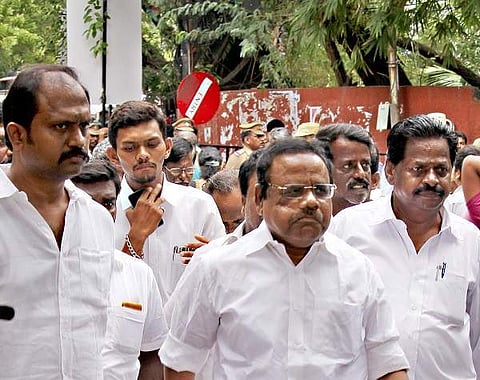

CHENNAI : If Assembly Speaker P Dhanapal had taken action against the then MLA, O Panneerselvam (presently the Deputy Chief Minister), and his supporting MLAs for defying the AIADMK whip and voting against the government in the February 18, 2017 floor test moved by Chief Minister Edappadi K Palaniswami, on the basis of their petition, the 18 MLAs would not have met the then Governor Rao and submitted their letter against the ruling government, said P S Raman, counsel for the 18 MLAs.
He told this to Justice M Sathyanarayanan, the third judge, when the entire matter came up before him on Monday.“The Speaker was playing politics. If he had issued notice on the petition against OPS and his supporters, this entire issue could not have occurred. The corruption charge against EPS would have been discussed internally,” the counsel added.
Unlike the earlier occasions, when the matter was heard by the first bench of Chief Justice Indira Banerjee and Justice M Sundar last year, Justice Sathyanarayanan’s court was comparatively poorly crowded, on Monday.Raman continued that the Speaker, under X Schedule of the Constitution, is functioning as a tribunal and his orders are amenable to judicial review like any other inferior tribunal. In this case, other than the high office Dhanapal was holding as a Speaker and the need to maintain neutrality, there is no other legal immunity, Raman said.
The entire disqualification proceedings, which commenced on August 24 and ended on September 18, 2017, were vitiated by gross violation of principles of natural justice along with various infirmities. The proceedings commenced and concluded in a hurried manner with the fear of a floor test and a presumption on voting, thereby not granting sufficient opportunity to the affected legislators. They were denied the right to cross-examine certain individuals including the Chief Minister and the party whip. Similarly, the Speaker had relied on materials that were not on record or otherwise not put to the petitioners to rebut. The whip’s complaint was primarily based on unsubstantiated media reports and extracts of electronic media without following the rules of the evidence, Raman said.
The whip had relied on the reports only to prove that the 18 legislators had met the Governor to topple the government. But the same reports did not say that the MLAs had the intention to go against the party or the government or to voluntarily give up their membership. The whip had failed to appreciate this aspect, Raman pointed out.